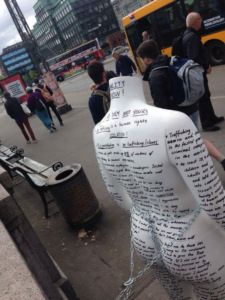A statue of a woman covered with messages about human trafficking and forced prostitution has been installed in front of the central station in Copenhagen to draw attention to these issues.
The sculpture is chained to a fence on Vesterbrogade and many passers-by have stopped in their tracks to read about the horrors trafficked people experience.
On behalf of the victims
An unknown artist behind the statue condemns the sexual exploitation of young girls and women and encourages people to stop buying girls for sex, so they wouldn’t be sold and abused.
At least 20.9 million children and adults are sold into commercial sexual services every year, according to one of the notes on the sculpture.
“Sex trafficking is a human rights violation,” it says.
“Women and girls make up 98 percent of the victims of trafficking for sexual exploitation. They are promised employment as housekeepers. Instead, the traffickers rape them, lock them up and force them to have sex in brothels.”
New legal framework
Meanwhile, the European Commission has today presented a progress report on its fight against the trafficking of human beings at the ‘Women Deliver’ conference in Copenhagen, which started on Monday and ends today.
“It is morally and legally unacceptable and inexcusable that in the EU of the 21st century there are human beings who are bought, sold and exploited like commodities. It is our personal, collective and legal duty to stop this,” stated Dimitris Avramopoulos, the EU commissioner for migration, home affairs and citizenship.
“We have put in place a strong and forward-looking legislative framework to do this. Our main responsibility is to ensure it is now fully implemented so that those responsible are prosecuted and the victims are fully protected and assisted.”

















